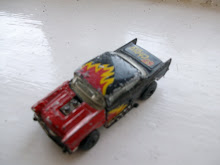I believe Dave Coleman over at No Ripcord is set to write a piece about ABC's 1982 debut album The Lexicon of Love, but I thought I'd get my own thoughts in first. Seems only fair, given it was I who recommended the album to him in the first place...
I came to ABC sometime in the mid 90s, from liking their three biggest hits over here, Poison Arrow, The Look of Love and All Of My Heart. At the time, Britpop was all the rage, but it's sounds and lyrical themes did little for me. Indeed, even now the only albums from that whole scene I'd consider listening to would be Blur's Parklike and Pulp's Different Class. ABC, on the other hand, had a huge sound: sweeping orchestral stabs with funky rhythm tracks. Later on, I would see how the band Chic had been a big influence here.
Yet as has been stated elsewhere, the band's frontman, Martin Fry, was fired up by punk in so much as it gave him the confidence to follow his own ambitions. As a student in Sheffield, he interviewed local outfit Vice Versa for his fanzine and ended up as their singer. Renamed ABC, the band benefited from writers such as Paul Morley moving away from the dark sounds of the likes of Joy Division and embracing the brighter 'new pop' angle. Aided by such support, debut single Tears Are Not Enough made the top 20.
For the album, ABC decided they needed the right man to create the sound they wanted. Trevor Horn was a one-time pop star (having fronted Buggles, of Video Killed The Radio Star one hit wonder fame) and growing name in the production world. On the back of working with Malcolm McLaren, he was looking for a new project. ABC turned out to be it, and he signed on for their second single, as a kind of testing ground.
That Poison Arrow turned out to be a brilliantly dramatic piece of pop did the trick, as did it's success. Work began on the album with Horn bringing in his team of Anne Dudley, Gary Langan and J.J. Jeczalik, soon to become the Art of Noise, to help with arrangements, engineering and working the then cutting edge Fairlight synthesiser.
Unlike with Horn's next big project, Frankie Goes To Hollywood, Horn was aided in his work by ABC being able enough musicians to play on their own album (drummer David Palmer would later become an in-demand session player with The The and Rod Stewart amongst others) as well as not being short of their own ideas: the spoken word middle section in Poison Arrow being suggested by saxophonist Stephen Singleton.
Though the title and general musical approach may suggest songs more in the Bacharach/David mold, Lexicon is essential an album about being dumped, as had happened to Martin Fry at the time. He even signals his weariness with traditional images of love and romance on All Of My Heart, singing "skip the hearts and flowers/skip the ivory towers".
ABC succeeded where many of their contemporaries failed by producing an consistently brilliant album. While at the time they were lumped in with the New Romantic movement, along with Duran Duran and Spandau Ballet, neither of those bands managed to knock together a set of cohesive songs as brilliant as ABC did. Particular highlights for me are Date Stamp (a cousin of sorts to Heaven 17's I'm Your Money) and Many Happy Returns, but the whole album is filled with hooks, huge choruses and fantastic playing.
The Lexicon of Love topped the album charts in the UK and did well in the States, leading to inevitable second album syndrome - as would happen with Frankie Goes to Hollywood. Working with Gary Langan, Beauty Stab stripped back the excesses of before and tried to tackle political themes. They were never again a serious force at home, instead focusing on the States, where they enjoyed a number of fine pop hits such as Be Near Me and When Smokey Sings. The Lexicon of Love remains their absolute peak, an example of the very best pop music can be.
Sunday, 12 December 2010
Subscribe to:
Post Comments (Atom)

No comments:
Post a Comment